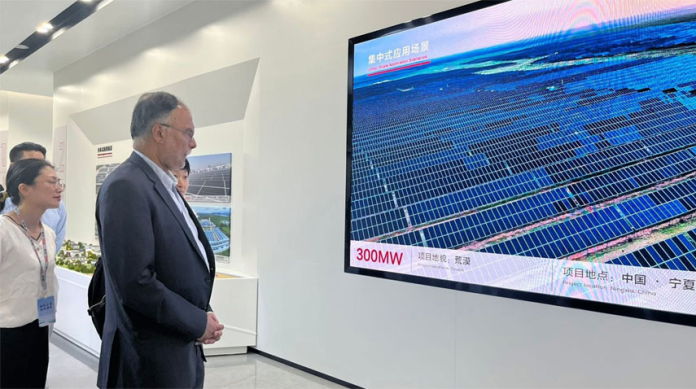TIANJIN, Sep 2 (DNA):Federal Minister for Planning, Development and Special Initiatives Professor Ahsan Iqbal visited Tianjin on the sidelines of the Shanghai Cooperation Organization (SCO) Summit to discuss new opportunities for Pakistan under the second phase of the China-Pakistan Economic Corridor (CPEC 2.0).
Tianjin, a major industrial and economic hub in northern China, is home to the country’s largest port in the region and serves as a global financial center.
During his visit, the minister highlighted the potential to deepen collaboration in key sectors critical to Pakistan’s long-term growth. “There are immense opportunities to strengthen Pakistan’s ports, renewable energy, and livestock sectors through CPEC 2.0,” he said, according to a news release on Tuesday.
Ahsan Iqbal toured the Huan Sheng New Energy Solar Plant, an advanced solar manufacturing facility at the forefront of the Fourth Industrial Revolution.
Calling it a “fully automated, cutting-edge project,” he praised China’s leadership in solar technology and emphasized that Pakistan is ready to adopt similar innovations.
“The future belongs to solar and green energy. We invite Chinese companies to invest in Pakistan’s growing clean energy market,” he said, adding modern energy projects like these would help Pakistan meet its sustainability goals and energy demands.
During his visit to a leading Chinese animal vaccine development company, Ahsan Iqbal discussed the possibility of establishing a production plant in Pakistan.
He said Pakistan is working closely with Chinese firms to explore this initiative, which he described as “critical for disease eradication and meat export growth.”
“Livestock is a strong pillar of Pakistan’s agricultural economy. Making animals disease-free and increasing our meat exports is an important national goal,” he said.
The minister also outlined Pakistan’s vision to create modern research centers that integrate Chinese expertise and serve as platforms for knowledge exchange, innovation, and technology transfer.
“We are establishing modern research centers that are a guarantee of future development. With the help of China, we are promoting full cooperation in agricultural biotechnology to improve crop yields, food security, and rural livelihoods,” he added.
The minister reiterated Pakistan’s commitment to harnessing the full potential of CPEC Phase II, which shifts the focus from infrastructure development to industrialization, innovation and sustainability.
He said CPEC 2.0 aims to build upon the foundation laid in the first phase, propelling Pakistan toward a more technologically advanced, economically diverse, and climate-resilient future.
“We are creating a platform to fully benefit from Chinese technology and experience. Pakistan-China cooperation will reach new heights under CPEC 2.0,” he vowed.

















